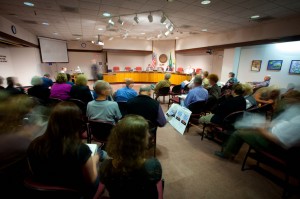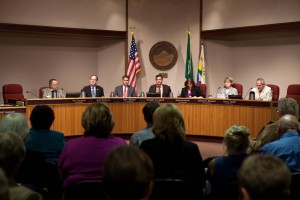Vancouver’s City Council stepped into the batter’s box last night to hear its first formal presentation by Short Season LLC, a California company which hopes to move forward with plans to relocate the Yakima Bears minor league baseball team to Vancouver.
The presentation was an overview of a proposal to construct a $23 million baseball stadium at Clark College to house the team. The workshop came the night before today’s expected vote by the Clark County Commissioners on a non-binding letter of intent agreement with the Short Season group.
Council members were quick to express their admiration for the game of baseball, but were equally quick to question the proposed stadium’s financial plan.
The City Council wasn’t asked to take any formal action after Monday’s presentation but did give City Manager Eric Holmes an informal go-ahead to research the baseball proposal and its impact on the city. Holmes said he expects the county administrator to approach him to discuss an inter-local agreement about baseball after the commissioners vote. Holmes said he wanted the council to have the necessary background information on the issue ahead of time.
The proposed finance plan calls for a 70-30 split in funding in which 30 percent of the financing will come from Short Season, a limited liability company, and 70 percent from a local admissions/entertainment tax. The tax would cost an additional 50 cents on each $10.
Council members were concerned that the current economic climate might be an inappropriate time to raise a tax to pay for an entertainment venue.
“An admission tax is really hard to swallow,” Councilman Jack Burkman said of the proposed finance plan.
Councilman Larry Smith echoed that concern and said that in the 20 years he’s been with the city, this is the worst budget situation he has seen. Smith said he’s concerned that the city not neglect important city infrastructure like fire stations and roads.
The council members’ concerns were that money raised by an admissions tax could be used for other city budget concerns instead of paying for the stadium. Holmes said the admissions tax could raise money in the city’s general fund.
Councilwoman Jeanne Harris said she likes the idea of an admissions tax to support the baseball stadium because that has a clear nexus to the stadium’s entertainment offering.
Harris also said a stadium could bring important synergy to the area that could spur other business development.
Councilwoman Jeanne Stewart said, “I like baseball too,” but added that she’s not sure it’s financially feasible.
Mayor Tim Leavitt said he had a conversation with a local business leader recently who told him baseball would be an attractive attribute to the community and would expand entertainment opportunities on this side of the river.
“We can’t afford not to seriously consider this opportunity,” Leavitt said, adding that he wants to hear more about the financing plan. “Now is not a time for leadership to clam up.”
Councilman Pat Campbell expressed the strongest hesitation about the whole proposal. He urged the council to determine the best use of a proposed admissions tax and said unless baseball is a sure thing the council shouldn’t be involved.
The council ended the discussion with an agreemeent to acquire more information. Some of that information will come from research by city staff. Other insights on the proposed finances will come from an analysis currently being undertaken by the Columbia River Economic Development Council.
During the council’s regular meeting, the citizen forum time was dominated by concern over baseball with most citizens telling the council that the public should not be involved in funding the stadium.
A representative from Washougal Motocross said businesses in Clark County should not bear the burden of an admissions tax to support baseball.
Another citizen, Temple Lentz, stepped to the podium and raised concerns that community priorities might not be in line with a public tax for a baseball stadium.
Several citizens also spoke to suggest that an arts facility could be valuable to the community and the citizens urged the council not to forget the future of the arts in Vancouver as they consider baseball.
A representative from the Central Park Neighborhood Association said he’s interested in seeing more information about the stadium project. He said he’s worried about the financial plan is concerning and questions the city’s priorities in discussing baseball during a time of budget and service cuts.
Most of the citizens who spoke during the meeting said they like the idea of having baseball in Vancouver, but were hesitant over the plan’s reliance on 70 percent public financing through an admissions tax on countywide entertainment – concerns that seemed to be echoed by the council members.
The Short Season representative said the proposed stadium would be a multi-use complex used by the team, Clark College and the community. He said it has been 103 years since there has been an opportunity to have baseball locally anywhere outside of Portland and it’s an opportunity his group is excited to take advantage of.











